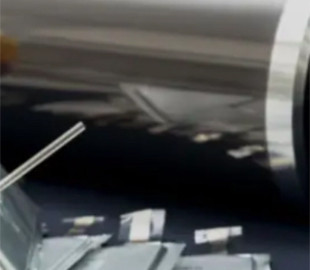
A fuse from LG Chem can improve the safety of smartphones and various other devices that use lithium- ion batteries.
LG Chem has developed a new material that can eliminate the risk of thermal runaway in lithium-ion batteries. Interesting Engineering writes about it.
Thermal acceleration is considered a serious problem for the industry. This is a chain reaction that can lead to fires and explosions in lithium-ion batteries. Thermal runaway occurs when the cathode and anode inside a battery inadvertently come into direct contact, causing a short circuit and generating heat.
In a matter of seconds, the temperature can rise to almost 1000°C. To solve this problem, LG Chem has developed a heat-sensitive material called Safety Reinforced Layer (SRL). The material, which suppresses thermal acceleration, is expected to be effective in preventing fires by rapidly blocking the reaction pathway in the early stages of overheating.
LG Chem solutions — it's a thin, temperature-sensitive material called Safety Reinforced Layer (SRL). It is incredibly thin, its thickness is only 1 micrometer — about one-hundredth the thickness of a human hair. This layer is placed between the cathode and the current collector, the aluminum foil that conducts electricity inside the battery.
200% Deposit Bonus up to €3,000 180% First Deposit Bonus up to $20,000SRL acts as an intelligent fuse. At normal operating temperatures, it allows electricity to flow freely. However, if the battery temperature rises above the safe range, the SRL reacts. When the battery's temperature rises above the normal range, between 90°C and 130°C, the material reacts to the heat, changing its molecular structure and effectively inhibiting current flow. What's more, SRL reacts quickly to any temperature changes.
This thermal runaway suppression material is very sensitive to temperature, its electrical resistance increasing by 5000 ohms (Ω) for every 1°C increase in temperature. The maximum resistance of the material is more than 1000 times higher than at normal temperatures. The material is reversible. As soon as the temperature drops, the resistance returns to normal, allowing the battery to operate normally.
To demonstrate the effectiveness of SRL, LG Chem conducted extensive testing. During nail penetration tests on mobile lithium-cobalt (LCO) batteries, none of the SRL-equipped batteries ignited. SRL can be easily integrated into existing mass production processes. Researchers have already demonstrated roll-to-roll production of SRL on pantographs at an impressive 5 kilometers per day.
LG Chem has completed safety testing of SRL in mobile device batteries and plans to continue testing larger-capacity EV batteries next year.< /p>

